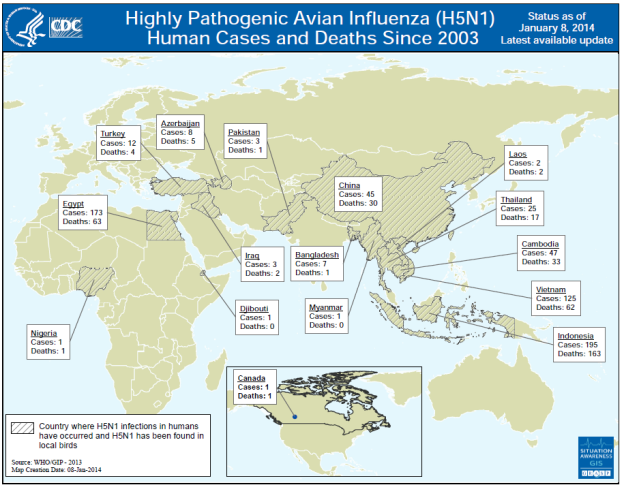CDC releases statement on Canadian H5N1 avian influenza case
In a follow-up to the imported H5N1 avian influeza death in Alberta, Canada, the US Centers for Disease Control and Prevention (CDC) released the following statement Wednesday evening in response to the unusual occurrence.
Here are some excerpts from the statement:
Canada has reported the first case of human infection with avian influenza A (H5N1) virus ever detected in the Americas. The case occurred in a traveler who had recently returned from China. H5N1 virus infections are rare and these viruses do not spread easily from person to person. Most of the 648 human cases of H5N1 infections that have been detected since 2003 have occurred in people with direct or close contact with poultry.
The Centers for Disease Control and Prevention (CDC) considers that the health risk to people in the Americas posed by the detection of this one case is very low. CDC is not recommending that the public take any special actions regarding H5N1 virus in response to this case. For people traveling to China, CDC recommends that people take the same protective actions against H5N1 as recommended to protect against H7N9 or other avian influenza A viruses. This information is available on the CDC website at Travelers Health: Avian Flu (Bird Flu).
According to CDC, more concerning for Americans right now is seasonal flu, which is widespread in much of the country. The agency urges people who have not gotten their seasonal flu vaccine this season to get vaccinated now. A seasonal vaccine will protect you against seasonal flu viruses.

H5N1 avian influenza map
Image/CDC
In addition, the CDC says “This is the first detected case of human infection with avian influenza A H5N1 virus in North or South America. It also is the first case of H5N1 infection ever imported by a traveler into a country where this virus is not present in poultry. No such H5N1 viruses have been detected in people or in animals in the United States.”
Read: H5N1 avian influenza in humans: By the numbers
CDC is in close contact with Canadian public health partners and has offered laboratory and other support as needed. The agency will continue to monitor this situation closely and work with public health partners to rapidly test any incoming specimens and advise local and state authorities regarding control measures if needed. Long-term preparedness measures against H5N1 include the existence of a stockpile of H5N1 vaccine in the Strategic National Stockpile.
More information on H5N1 is available at Highly Pathogenic Avian Influenza A (H5N1) Virus.
For more infectious disease news and information, visit and “like” the Infectious Disease News Facebook page and the Outbreak News This Week Radio Show page.















